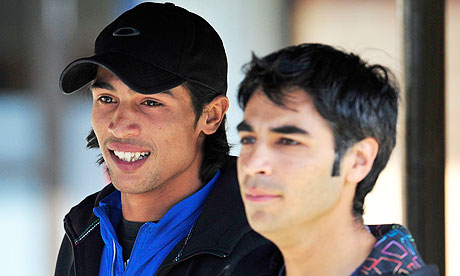 |
| Mohammad Amir |
How Sweet It Is!
And who could blame young Mohammad Amir for celebrating? It's not like anything really comes easy for the Pakistan boys.
Online Cricket Updates, Cricket News and Highlights, Cricketer Profile, Cricket Match Schedule at Cricket 24hrs
 |
| Mohammad Amir |

That Mohammad Amir, a precocious talent, is at the heart of the current allegations is particularly damaging. Cricket must put its house in order fast. Nothing undermines the credibility of any sport more than the suspicion that what you are watching is in fact a fix.
Indeed, this whole saga is very sad. It is damaging to the reputation of cricket, and is another blow to Pakistan, a country that is still partly under water and desperately in need of good news. Misgoverned for decades, it has a political class that contains few people whom anyone seriously looks up to for moral inspiration – hence, in part, the almost fanatical devotion to a sport that supposedly incarnates the ideal of fair play.
And the worry is that this is merely the tip of the iceberg. I find it hard to believe that we’re just talking about a few no-balls. I’m not pointing fingers at individuals but if guys get sucked into so-called spot-fixing, it can lead to more sinister stuff.
One minute you’re conceding a prearranged number of runs in a bowling spell, the next you’re throwing an actual match — and this fixer is now saying the Sydney Test against Australia in January was thrown.
The game cannot afford for this to be swept under the carpet and if that means Pakistan, when this tour comes to an end, must serve a temporary exile from international cricket then so be it.
In the case of Amir, who is 18, it is terrible that a supremely talented youngster could be exposed to this. He is a delightful bowler with terrific skills. How sad it would be if it turns out his career is wrecked, but if anyone is involved in corruption he must be banned for life.
In 2000, Qayyum recommended that "the PCB increase the pay of its cricketers and develop for them more avenues of income ... Pakistani players for all their talent are not as well-paid as their counterparts abroad. As long as they are underpaid the tendency to be bribed remains."
The future will hold some pretty uncomfortable questions for the Anti-Corruption Unit at the International Cricket Council. Why has it taken a British newspaper sting to bring it out in the open? What has the ACU been doing? It has operatives working all over the world and the ACU costs the game millions. But a British newspaper story has blown it open. It is embarrassing.
It is about how an individual approaches life. What he wants to be and how he wants to live. When money is thrown on the table some people will say 'take it away and get out'. Others will take the money. It is about dishonesty, not how much you are being paid.
You won't, in short, solve anything by draconian bans, by wiping whole nations from the cricketing map. You need to target the pushers. Pakistan, in yet another way, needs help and understanding – not ritual rage.
Too many trusting men allowed themselves to be mesmerised by the myth of Pakistan cricket, its mood swings, its brilliant highs and devastating lows. They were spellbound and did not spot that the truth was considerably nastier, more grimly depressing.
A riveting battle continues
 A new potential great on our hands© PA Photos
A new potential great on our hands© PA Photos